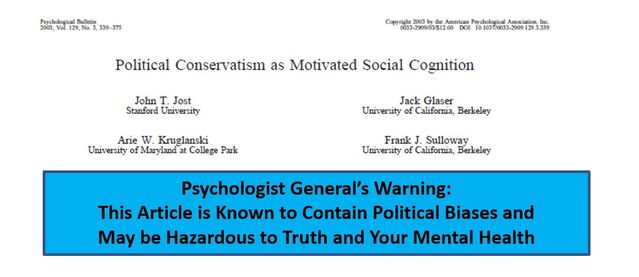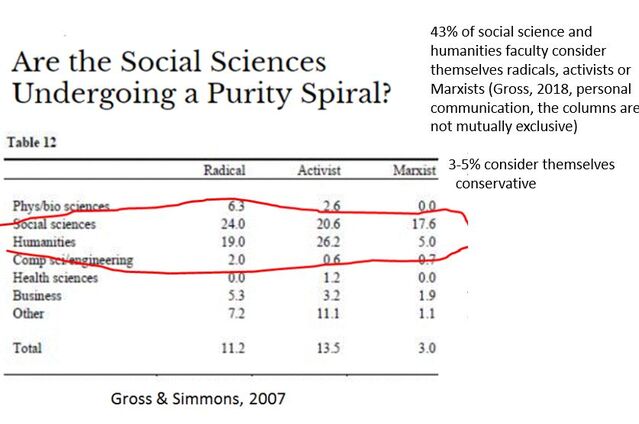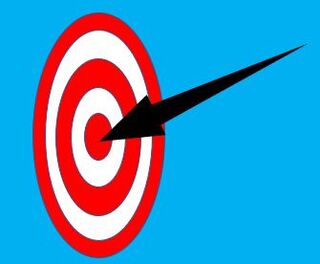Psychology
How to Detect Politically Biased Psychology
Four Guideposts
Posted December 26, 2021 Reviewed by Hara Estroff Marano
Key points
- Psychological scientists are overwhelmingly left in their politics.
- When left-leaning scientists produce left-affirming findings, there are two explanations: they are biased or they are valid.
- Four guideposts potentially flag biased science.

There is no Psychologist General, and studies do not come with a warning. Scientific articles will have all the trappings of science. They will have Methods and Statistics, they might even be Experiments. They are often filled with impressive-sounding jargon. What's an intelligent layperson to do? In this essay, I identify four guideposts that one can use to infer whether an article is so politically biased it should not be taken seriously.
Warning Sign I: The Finding Vindicates Some Left Narrative

The political distribution of psychological scientists is so skewed that the numbers sound like delusions of right-wing propagandists. Over 98% of the psychological scientists in this survey voted for Obama over Romney, and, at elite colleges and universities, 90-100% of faculty identify as Democrat or left. In addition to the results shown above, this 2020 survey also found that about 40% of social science faculty identify as radicals, activists and/or Marxists. Although people on the right (including scientists) may be just as likely to be biased as those on the left, there is hardly any right in psychology.
Warning Sign I, then, is the answer to this question: "Does this study's main claims appear to vindicate some sort of left narrative?" This is a necessary but not sufficient condition to infer political bias. It is necessary because, if the claim does not vindicate a left narrative, it cannot possibly be left-biased. It is not sufficient because the claim or study may simply be valid! Nonetheless, inferring political bias starts with answering this question. To do so, one needs to be able to identify major left narratives. Although it is impossible to identify them all, here are some common ones:
- Equalitarianism, which includes any of the following ideas:
- There are no biological differences between groups on socially valued traits (and, especially, no genetic differences).
- Prejudice and discrimination are the only sources of group differences (and anyone who says otherwise is bigoted).
- Society has a moral obligation to arrange itself so that all groups are equal on socially valued outcomes.
- Any claim framed as advancing "social justice," or the programs designed to increase it (such as diversity, equity, and inclusion programs, diversity trainings, implicit bias trainings, etc.).
- Liberals are more competent and morally superior to conservatives (or more conservative political parties, which can vary by country). A subset of this is liberal social scientists denying that they, or their science, is biased when it finds conservative inferiority. Another subset is seeing conservatives' but not liberals' behavior, beliefs, and attitudes as things to be explained (as if liberalism is "normal" and only deviations from normality need explanation). For an example, see the article pictured at the head of this essay.
- Attitudes supporting environmentalism are good.
However, even these sorts of claims are not necessarily biased just because they vindicate some left narrative. It could be that the studies are well-conducted and their findings actually vindicate some left narrative. If social scientists engage in relatively unbiased truthseeking in their research, sometimes they will produce findings that vindicate left narratives.
However, you do have to start with the answer to the question of whether the study vindicates some left view, value, or narrative. If it does, you have a contender but have not yet strongly established bias. How can you tell whether a supposedly scientific claim is biased to the point of unbelievable? One can look for several additional Warning Signs.
Warning Sign II: Ignoring Counternarrative Evidence and Scholarship
This Warning Sign requires some knowledge about the evidence and scholarship. You cannot know something is ignored unless you first know it exists. This turns out to be more difficult than it may seem, because if a field is in the business of systematically ignoring or downplaying certain types of scholarship, you may not know it exists. I have no answer to this other than staying reasonably well-informed about psychological research, which is now vastly easier than it once was. In psychology and other social sciences, one can get quite the education in counternarrative scholarship by following contrarian psychologists on Twitter, who are often quite vocal. Here are some of my recommendations: Cory Clark, Geoffrey Miller, Steven Stewart Williams, Rolf Degen (not a contrarian, but posts lots of stuff that conflicts with common beliefs), Free Black Thought (not a psychologist but posts lots of excellent thought pieces on social science), Oliver Corneille, Eric Kaufmann, LJ Zigerell, Zach Goldberg, John McWhorter. For essays and articles revealing how scientists routinely ignore counternarrative evidence, go here, here, here, here, here, and here.
Warning Sign III: The One-Eyed Watchdog
From The Orwelexicon, a one-eyed watchdog is someone who only guards against wrongdoing on one side. One-eyed watchdogs are a sign of our polarized times, in which those on the left routinely warn of rising fascism, and those on the right routinely warn of the dangers of the radical left (I suspect both are right, but rising radicalization is a blog for another day).

However, when social science is politicized, the one-eyed watchdog may make an appearance. It can usually be detected when a paper presents evidence of the depravity, stupidity, ignorance, or dogmatism of those on the right, and either denies or simply ignores comparable levels of depravity, stupidity, ignorance, or dogmatism on the left.
Of course, in any given situation, these undesirable characteristics need not be exactly equal—however, there is now accumulating evidence that they can be found in ample measure on the left (such as here, here, here, and here). I cannot resist pointing out that previous failures to find them on the left probably reflects the ways in which political biases distort psychological science.
Selective calls for rigor can be viewed as a type of one-eyed watchdog. All psychological studies have limitations, weaknesses, and imperfections. If ostensibly scientific criticisms are deployed to denounce a study for political wrongthink but the same criticisms are never applied to political-right-thinking studies with the same limitations, weaknesses, and imperfections, then we have pretty good evidence of political biases in play. I described some examples of this here.
Warning Sign IV: Bullseye
If an article reports a claim that seems to vindicate some left narrative but is demonstrably unjustified, you have hit the political bias bullseye. If it is demonstrably unjustified in a political direction then it is politically biased (this is just as true for unjustified right-vindicating conclusions). When a researcher's errors are consistently in one political direction, then it is also fair to reach a conclusio ad hominem—a conclusion about the person (that they are biased). Demonstrably unjustified comes in three main flavors:
1. Outright wrong
2. Not enough evidence to support it (this includes well-known logical fallacies, such as leaping to a conclusion and failing to rule out alternative explanations). They may be right, but the evidence is too uncertain to be sure. Thus the claim is unjustified, even if it is utlimately discovered to be true.
3. Controversial because there is evidence that supports AND opposes it. Again, one "side" may ultimately be proven right, but until that actually happens, claiming one side is right is unjustified in the presence of both confirmatory and contradictory evidence.
Psychological scientists have made all sorts of unjustified claims, such as:

90% of Americans are unconscious racists (wrong)
Remove stereotype threat and Black and White students would have equal standardized test scores. (wrong).
People's beliefs about groups (stereotypes) are generally inaccurate. (wrong).
Sex differences are generally trivial in magnitude (probably wrong, controversial).
Peoples lives are dictated by self-fulfilling prophecies (wrong).
Conservatives are generally more biased than liberals. (probably wrong, definitely controversial).
Power posing will help women overcome being socialized into passive roles. (probably wrong, definitely controversial).
Climate skeptics are delusional conspiracy theorists who also believe the Moon landing was a hoax (wrong).
“..our study suggest that political bias may not plague psychological science to the extent that it dominates many other domains of society.” (not enough evidence/leaping to a conclusion because their study did not examine political biases among any "domains of society" other than psychological science).
Often, however, you need some level of numeracy or familiarity with the particular studies in question to understand why the left-affirming claims are unjustified. On the other hand, sometimes, this is not particularly difficult for any reasonable intelligent, numerate or educated person. It just takes attending to the details of the study. For example, in this essay, Cathy Young, a journalist, easily debunks a study purporting to show bias against female political candidates simply by examining its reported results (no math required).
Conclusion
None of these Warning Signs are guaranteed to produce a correct conclusion about whether a conclusion is politically biased (except Warning Sign IV). Nonetheless, if it walks like a duck, quacks like a duck, and flies like a duck, even though it might actually be an alien invasion or a praying mantis, it is reasonable to conclude that it is a duck. It is in this sense that these guidelines are useful.




